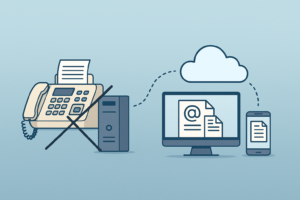As long as there have been people, there have been scammers of some kind. Today, deceptive criminals are aided by the same technology that helps everyone else in their daily lives – the only difference is that they use it for wrongdoing. Anyone can claim to be a Nigerian prince from behind their computer screen and bilk unsuspecting targets for their financial information over email. All it takes is a valid email account – personal or otherwise.
No matter what the nature of an email account is, it is susceptible to all the dangers of the Internet. This is bad news for businesses that use email in excess, and chances are that a lot of organizations out there fit that bill to a T. The more that a company uses email, the greater the chance that they will experience a data breach of some kind.
The vulnerability of email is not speculation – this is reality. There is really nothing stopping a well-crafted phishing scam from appearing in a corporate inbox and fooling an unwitting employee. These messages can be as innocuous as an offer for a free oil change or as potentially-frightening as a threat of prosecution for uncommitted crimes. Here is a look at three of the email-based scams that could be threatening your business right now:
1) Vendor identity fraud
It's common in the business world to make payments to vendors. These organizations provide client companies with vital services and products, and making sure they are compensated on time and appropriately is critical. But according to ABC affiliate WHSV, a recent scam identified by the Better Business Bureau is targeting this daily operation as a way to siphon money from corporate bank accounts.
"As part of your job, you pay invoices for several of your business's vendors," BBB stated in a release. "One day, you receive an urgent email from an executive in your company telling you to change how you pay invoices from a vendor. Instead of sending a check, you now need to wire the money straight to a bank account."
This is one of many examples of phishing attacks where a ruse is made possible by malicious hacking. Cybercriminals break into company emails and gain enough information to pass as one of the organization's suppliers. The rest is easy, and can potentially leave businesses out hundreds of thousands of dollars depending on the nature of the vendor. According to BBB, this problem can only really be prevented with a keen eye and some changes in policy and procedure – things that are not always guaranteed to be followed or instated.
2) Hackers impersonate branch of FBI
Nobody likes being accused of crimes that they didn't commit. This is especially true when the FBI is involved. But a new scheme involving the Internet Crime Complaint Center has many people thinking their arrest is imminent if they do not fork over a hefty fine via online transaction – something that is unheard of in actual law enforcement agencies and that the FBI has been forced to address.
"The emails claim that the victim is the subject of a criminal report and that charges are forthcoming," wrote DailyFinance contributor Mitch Lipka. "They are then told that they have one or two days to respond or risk arrest, IC3 said. Those who respond are told they have to send money via prepaid cards if they want to avoid prosecution."
3) New Zealand law firms fooled by "clients"
Lawyers are trained to always read between the lines and examine the fine print in legal documents, but what about in their supposedly-secure communications? This is one concept that has been inadvertently brought up in New Zealand thanks to a scam targeting law firms and their clients.
There are plenty of things that can be done over email, but that doesn't mean that they should be. Client and lawyer communications are one of these tasks. According to The National Business Review, criminals will pose as either a law professional or someone they currently represent, asking the opposite party to make a payment or carry out a transaction. This not only puts funds in danger, but also sensitive information. This may land a law firm in serious legal trouble.
Email use must be curbed
How people handle their personal correspondences is their own business, but when they are at work they should be outfitted with effective communications tools. Increasingly, it has been realized that email does not fit this bill, and must be treated as such. One way to handle this issue is to seek out the secure nature of cloud-based faxing, which possesses tighter encryption methods than email. Additionally, cloud-based fax is software-defined, meaning that it can be accessed and used on smartphones.
Enhance enterprise communication, collaboration and compliance efforts with a proven FoIP solution from FaxCore. Contact FaxCore today to learn more about their 'Partly-Cloudy' fax solutions.




